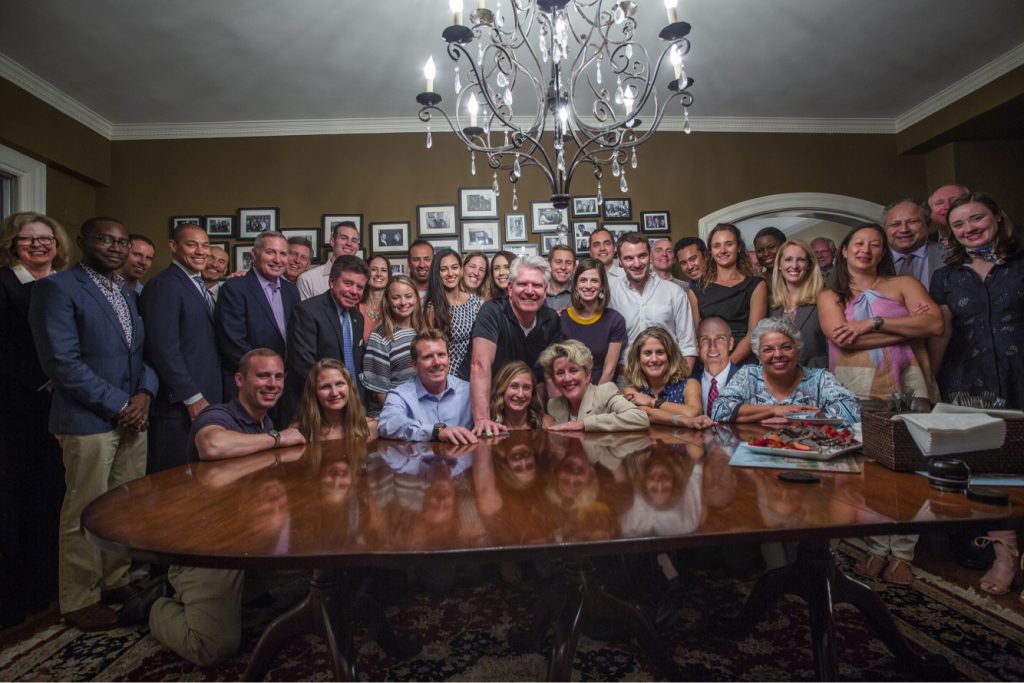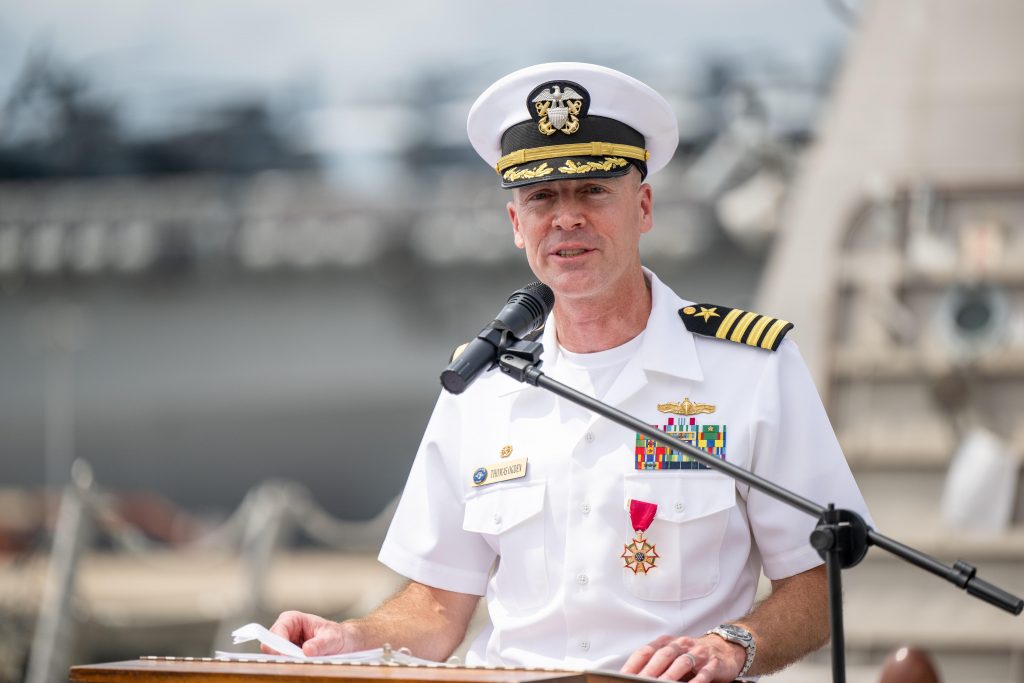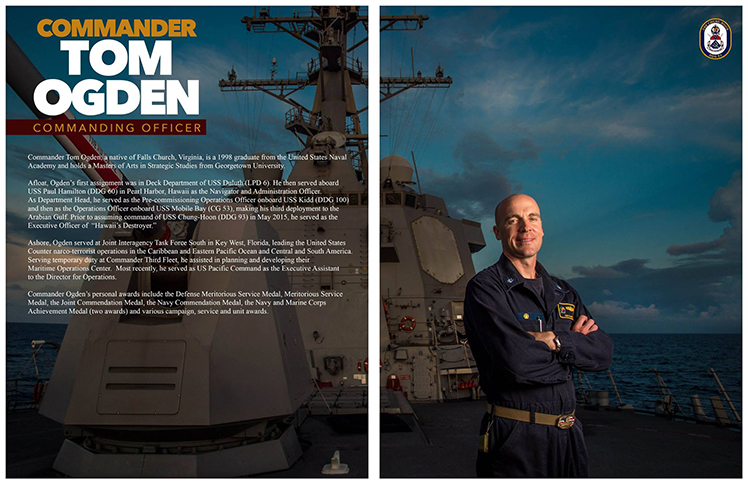WHF Profile: Tom Ogden (2018-19)
Can you tell us about yourself and your work before the White House Fellowship?
Having served almost 20 years as a Surface Warfare Officer in the U.S. Navy and recently completing an assignment as Captain of a Destroyer deployed to the South China Sea prior to being selected as a White House Fellow, the new opportunity as a Fellow working outside of the Department of Defense was a fascinating opportunity. I looked forward to the change of scenery from military operations that I was used to the other portions of the Executive Branch of our Government.
How did you hear about the White House Fellows Program and what made you decide to apply?
A mentor in the Navy (CDR Spencer Abbott, WHF 2015-16) introduced me to the White House Fellows Program and encouraged me to apply whenever I had the opportunity in my career timing. He completed the program at the same timeframe in his career as I did and provided an example that was easy to emulate. He is no longer with us—so hopefully I can provide an example to someone else as he did for me.
What goals were you hoping to achieve through the Fellows program?
To be part of a team that pushed each other to make progress; to create ideas, policies, or initiatives that made progress for our nation; to learn from a group of Fellows with diverse backgrounds and experiences in order to bring those skills back to further advance the U.S. Navy.
Where were you placed and what was the focus of your work?
I was assigned as Special Assistant to the Director of the Office of Personnel Management (OPM) and focused on streamlining the federal Human Resource (HR) policies for the government. A specific project was to consolidate and mine the HR data available (evaluations, career timing, payscales) on the over 2 million federal employees to determine trends and outliers in order to propose more efficient and effective HR policies.
What was your fellowship class like?
Our class was a unified team that I could best describe as an environment where we felt as though we had 13 other ‘hype-men/women’ around us encouraging each other to be their best. It was mentally positive to know that I could reach out to any of them at any time and lean on them to find a solution to the most difficult issues I was facing.
What did you do immediately after the Fellowship?
The U.S. Navy assigned me to be the Commodore of Destroyer Squadron SEVEN in Singapore, responsible for operations and maintenance of assigned U.S. Navy ships in Southeast Asia and the Indian Ocean.
How did the trajectory of your life and work change after the White House Fellowship?
Rocket ship! Although I thought I was on a good trajectory prior to the Fellowship, the encouragement and development from all the White House Fellows accelerated it all. It also made me realize that I needed to do more to develop and encourage others, especially those who are pursuing selection as a White House Fellow.
Can you tell us about peers and mentors who helped you on this path?
Strong peer and mentor encouragement, critique, and competition has been key to anything I have accomplished. I also continue to realize how often it has been that mentors have pulled me up to greater accomplishments and opportunities also. Without their assistance, guidance, and many times behind-the-scenes influence, I’m not sure I would be in the same place either personally or professionally. Ten key mentors that stand out: Dr. Jeff Pon (OPM Director and my White House Fellows placement principal), Admiral (ret) Scott Swift (Commander, US Pacific Fleet), VADM Fred Kacher (WHF 2006-07), RADM Joe Cahill (Commander, Naval Surface Forces Altlantic), Peter Malnati (friend and PGA golfer), Travis Brown (WHF 2018-19), Tim Ogden (my older brother and CEO, Blue Ivy Partners), Carlos Benitez (US Naval Academy roommate, Global Wealth Manager Merrill Lynch), Congressman Marty Russo (US Congressman 1975-1993), Nancy Ogden (my wife).
What are you working on now?
I recently completed my first assignment in the Pentagon as Deputy Director for Plans, Policy and Integration on the Navy Staff (OPNAV N5B) with a follow on assignment to Hawaii as Executive Assistant to Commander, U.S. Pacific Fleet.
Are there any books you’d recommend for those interested in doing similar work?
My top 5 books:
“The Score Takes Care of Itself-My Philosophy of Leadership,” Bill Walsh
“The Virtues of War,” Steven Pressfield
“Thinking, Fast and Slow,” Daniel Kahneman
“Sources of Power: How People Make Decisions,” Gary Klein
“Execution: The Discipline of Getting Things Done,” Larry Bossidy and Ram Charan
It sounds like all of those experiences gave you a set of new skills that you might not have had in your previous role. How did you translate those skills into your career and work now?
A specific experience as a White House Fellow that was very impactful to me was the resignation of my principal early in my time as a Fellow. Dr. Pon quickly brought me on to the OPM team and provided me complete access to the OPM portfolio—the model of the White House Fellows experience. Complete exposure to this situation and how it unfolded provided me a set of skills that I could not have imagined: the tension and balance of power between Executive and Legislative branches; how to message and communicate during crisis; continuity of leadership through transition; how to remain true to individual or group morals.
Have you and your classmates remained close since your Fellowship year?
Our class of Fellows remains extremely close, with many of us leaning on each other for advice and guidance during times of difficulty. We have had reunion dinners, virtual fireside chats, visits to each other’s homes, and random banter meant to drive each other towards success.
What advice would you give to prospective applicants?
Be you. You need to make all your positive traits stand out, while remaining aware that any flaws you have will likely be exposed also. Don’t try to hide anything, but let the true and best version of yourself come through. The application process is extremely rewarding, both personally and professionally. While working through the process, an applicant should seek to understand the true reason why they are applying for the program and try to make that come across throughout the process from the online application, to in-person regional or national interviews, to the year as a Fellow. If your foundation for applying is solid, you will consistently have an experience that makes you a better person and teammate and a contributor to the great community of White House Fellows.




